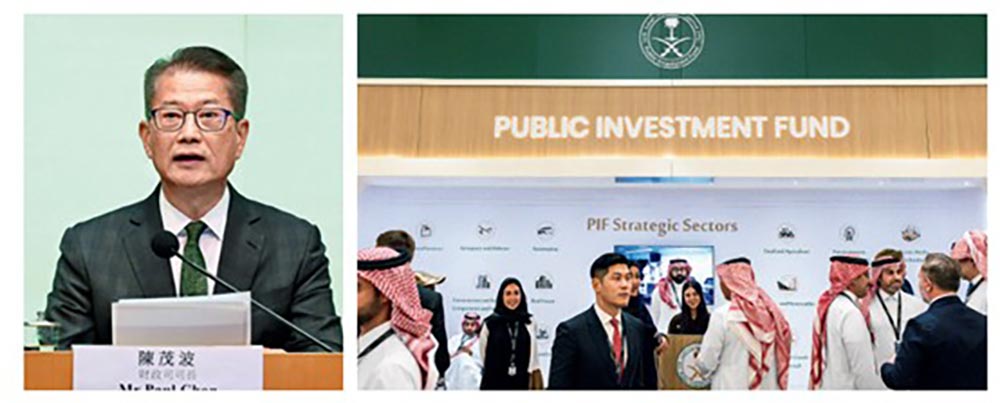
去年10月,香港财政司司长陈茂波前往沙特阿拉伯首都,也是沙特证券交易所所在地利雅得。在沙特官员见证下,陈茂波按下按钮,启动了中东地区最大的交易所交易基金(ETF)。该基金规模12亿美元,追踪在中国香港上市的30家符合伊斯兰教法的公司(大型银行汇丰因收取利息不符合标准被排除在外)。
由于香港努力与海湾地区新兴资本加强联系,陈茂波与香港交易所集团行政总裁陈翊庭(与陈茂波无亲属关系)等几位同僚频繁出访中东地区。
“过去三四年,国泰航空香港到迪拜的航班一直爆满,”汇丰银行首席亚洲经济学家范力民(Frederic Neumann)表示。(他补充说,自己“前往中东也比以前频繁”)。
如今众多亚洲经济体都在努力吸引海湾地区的资金,香港只是其中之一,资金来源也不仅是个人投资者。中东的主权财富基金,不管是沙特阿拉伯万亿美元规模的公共投资基金(PIF),还是阿联酋一系列投资机构,都在将目光转向东方。海湾地区投资者希望实现投资多元化,亚洲拥有年轻的人口结构、充满活力的科技行业和快速增长的经济体,提供了最具吸引力的投资机会。
“海湾国家要寻找新市场,最具吸引力的新市场就在亚洲,”总部位于迪拜的地缘政治风险咨询公司盖特豪斯咨询(Gatehouse Advisory)合伙人瓦苏基·沙斯特里(Vasuki Shastry)解释道,“如果能与其他投资基金合作,说不定就能发掘出下一个马云,下一个超级潜力股。”
然而,日益紧密的金融联系不只是商业行为。从战略层面来看,中东正努力构建后石油时代的经济格局;从地缘政治角度而言,海湾地区和亚洲都在努力对冲风险,因为美国不断施展经济影响力,新上台的特朗普政府可能搅动贸易和投资关系。

中东各国政府最初(现在仍然)在资金管理上更倾向于欧洲为中心。像沙特阿拉伯、科威特和阿联酋等国都将石油收入投入到北美和欧洲发达经济体的公开市场。举个例子,据智库亚洲之家的数据,阿布扎比穆巴达拉投资公司(Mubadala Investment Co.)近一半海外投资流向了美国,远超其他任何地区,投向中国的资金仅占2%。
这意味着沙特、阿联酋等海湾合作委员会(GCC)国家的投资者“在亚洲崛起的过程中有点错失了良机”,范力民说。如今,中东正努力追赶。
另一方面,随着西方国家加强对海外投资的审查,海湾投资者也在寻求丰富投资组合的选择。去年,英国阻止了阿联酋支持的《每日电讯报》收购计划,欧洲各国政府也对海湾实体试图增持本地电信公司表示不满。
“海湾资本想收购西方资产可不容易,”沙斯特里说,“海湾国家对于此类投资受到的审查感到不自在。”
所以海湾地区将目光投向其他市场,尤其是亚洲。“中东主权财富基金在亚洲的投资策略一直相当激进,”牛津大学(University of Oxford.)主权财富基金专家阿纳·纳克瓦洛瓦伊特(Ana Nacvalovaite)说。
海湾对亚洲的投资规模虽小,但不断增长。据跟踪主权投资的全球主权财富基金数据显示,2022年至2024年间沙特公共投资基金对亚洲经济体投资了66亿美元,是此前三年投资金额的两倍。同一时期,阿布扎比投资局(Abu Dhabi Investment Authority)、穆巴达拉投资公司和卡塔尔投资局(Qatar Investment Authority)等海湾合作委员会基金也增加了对亚洲的投资。
海湾投资者对亚洲的期望不仅仅是投资回报。汇丰银行的范力民认为,中东基金正“努力获取有助于本国经济发展的技术和专业知识”。
海湾投资者,尤其是阿联酋投资者一直喜欢在印度投资,主要因为印度与海湾地区有长期的贸易和商业联系。“众多印度亿万富翁住在阿联酋,彼此之间很熟悉,”沙斯特里说,“在印度投资就像在自家门口投资一样。”
还有中国,中东石油的重要买家之一。范力民表示,海湾合作委员会对中国的投资比在其他地方“针对性”更强,“投资中国是因为地缘战略多元化和获取技术的双重需求。”
纳克瓦洛瓦伊特表示,中东投资者正在关键领域寻找重大机会,而亚洲的关键领域就是科技。以电动汽车为例:2023年底,与阿布扎比政府旗下专注移动出行领域的CYVN控股公司,向中国电动汽车初创企业蔚来投资了22亿美元。
电子游戏是另一个引起中东关注的新兴领域。沙特公共投资基金在游戏领域进行了多笔投资,包括持有任天堂(Nintendo)、卡普空(Capcom)和Nexon等公司股份,还投资了中国电竞公司英雄电竞。
总部即将迁往阿布扎比的电竞公司NIP集团创始人希查姆·查伊内(Hicham Chahine)表示,海湾地区对电竞行业的兴趣有助于投资者打入蓬勃发展的市场:“中国是全球最大的游戏市场。印度、东南亚、日本和韩国的潜力也不小。在游戏和电竞方面东方国家一直比西方领先。”
最后是东南亚,尤其是以穆斯林人口为主的马来西亚和印度尼西亚,两个国家希望借助共有的文化和宗教纽带吸引投资。“印尼人和马来西亚人非常看重文化相似性,”沙斯特里解释道。
在东南亚,海湾投资者将资金投向房地产、数据中心、原材料和基础设施等领域。最近印度尼西亚从阿联酋获得了100亿美元的投资承诺,用于成立新的可再生能源合资企业,该项目获得了印尼新成立的达南塔拉(Danantara)主权财富基金支持。
达南塔拉首席投资官潘杜·夏吉里(Pandu Sjahrir)表示,基金成立过程中阿布扎比投资者一直“保持密切联系”。他对印尼从海湾地区获得更多投资相当乐观。“他们发现印尼拥有丰富的资源、廉价能源还有庞大的人口,尤其是消费领域优势明显。过去八到十年里,他们从印尼赚了钱,所以想加大投资力度。”
亚洲金融中心也在努力吸引更多中东投资。香港和新加坡都是财富管理和家族办公室汇聚之地,目前两地都在大力吸引海湾富人的资金。
香港尤其积极。2023年,香港官员曾大胆尝试邀请石油巨头沙特阿美(Saudi Aramco)在香港二次上市,不过目前尚未成功。与此同时,港交所在利雅得开了办事处。沙特证券交易所组织的资本市场论坛也在香港举办。
汇丰银行的范力民承认,现在还“很难判断”香港吸引中东资金的努力是否奏效。不过香港与中国内地联系紧密,可能在吸引资金流动方面更具优势,毕竟中国是技术来源地、石油买家以及潜在的安全合作伙伴。“资金流向确实会受到当下政治现实的影响,”他说。
沙特和阿联酋努力在国内和国际上投资的同时,亚洲国家和公司也在谋求对海湾地区投资。不少中国大型企业选择向中东拓展业务。例如,去年中国外卖巨头美团在沙特推出了服务,这是该公司首次在中国境外开展业务。
“对中国企业来说,中东是最赚钱的市场,”沙斯特里说,尤其是美国和欧洲等发达市场纷纷对中国商品加征关税的情况下。他补充道,迪拜“满大街都是中国制造的汽车”。据研究公司Canalys的数据,传音、小米和荣耀三家中国手机品牌在中东市场(包括沙特等海湾国家,以及伊拉克、黎巴嫩、约旦和以色列)占据了37%的份额,超过了苹果或三星的市场份额。
寻找新市场的中国企业或许能得到海湾政府的帮助。像沙特公共投资基金之类基金就迫切希望投资本国经济,利用资金吸引新的国内办公机构和制造中心落地。今年1月初,个人电脑制造商联想获得了与沙特公共投资基金旗下公司埃耐特(Alat)的20亿美元投资,在利雅得成立了新的中东总部,并在沙特建了工厂。
其实早在特朗普上台之前,海湾国家就在考虑其他选择。去年,沙特阿拉伯和阿联酋表示正考虑加入金砖国家,这一国际集团正日益成为可与西方抗衡的力量。如今,阿联酋已成为正式成员。
然而,中东地区与美国的安全联系紧密,可能导致海湾地区与中国建立不受限制的金融关系变得困难。2023年,美国对阿联酋人工智能公司G42越发关注,该公司与中国科技公司关系密切,包括被美国制裁的华为。到2023年年底,G42同意切断与中国硬件供应商的联系,首席执行官肖鹏承认公司无法“同时与中美两方合作”。几个月后,微软便迅速对其投资了15亿美元。
不过,海湾国家可能认为,在日益复杂的世界中投资需要一些灵活性。“地缘政治现实促使全球投资者如更注重多元化,中东投资者也不例外,”汇丰银行的范力民表示。
印尼达南塔拉公司的潘杜则坚信,海湾国家会被印尼提供的机会吸引:“海湾错过了印度,又错过了中国,他们不想再错过这次机会。”(财富中文网)
去年10月,香港财政司司长陈茂波前往沙特阿拉伯首都,也是沙特证券交易所所在地利雅得。在沙特官员见证下,陈茂波按下按钮,启动了中东地区最大的交易所交易基金(ETF)。该基金规模12亿美元,追踪在中国香港上市的30家符合伊斯兰教法的公司(大型银行汇丰因收取利息不符合标准被排除在外)。
由于香港努力与海湾地区新兴资本加强联系,陈茂波与香港交易所集团行政总裁陈翊庭(与陈茂波无亲属关系)等几位同僚频繁出访中东地区。
“过去三四年,国泰航空香港到迪拜的航班一直爆满,”汇丰银行首席亚洲经济学家范力民(Frederic Neumann)表示。(他补充说,自己“前往中东也比以前频繁”)。
如今众多亚洲经济体都在努力吸引海湾地区的资金,香港只是其中之一,资金来源也不仅是个人投资者。中东的主权财富基金,不管是沙特阿拉伯万亿美元规模的公共投资基金(PIF),还是阿联酋一系列投资机构,都在将目光转向东方。海湾地区投资者希望实现投资多元化,亚洲拥有年轻的人口结构、充满活力的科技行业和快速增长的经济体,提供了最具吸引力的投资机会。
“海湾国家要寻找新市场,最具吸引力的新市场就在亚洲,”总部位于迪拜的地缘政治风险咨询公司盖特豪斯咨询(Gatehouse Advisory)合伙人瓦苏基·沙斯特里(Vasuki Shastry)解释道,“如果能与其他投资基金合作,说不定就能发掘出下一个马云,下一个超级潜力股。”
然而,日益紧密的金融联系不只是商业行为。从战略层面来看,中东正努力构建后石油时代的经济格局;从地缘政治角度而言,海湾地区和亚洲都在努力对冲风险,因为美国不断施展经济影响力,新上台的特朗普政府可能搅动贸易和投资关系。
中东各国政府最初(现在仍然)在资金管理上更倾向于欧洲为中心。像沙特阿拉伯、科威特和阿联酋等国都将石油收入投入到北美和欧洲发达经济体的公开市场。举个例子,据智库亚洲之家的数据,阿布扎比穆巴达拉投资公司(Mubadala Investment Co.)近一半海外投资流向了美国,远超其他任何地区,投向中国的资金仅占2%。
这意味着沙特、阿联酋等海湾合作委员会(GCC)国家的投资者“在亚洲崛起的过程中有点错失了良机”,范力民说。如今,中东正努力追赶。
另一方面,随着西方国家加强对海外投资的审查,海湾投资者也在寻求丰富投资组合的选择。去年,英国阻止了阿联酋支持的《每日电讯报》收购计划,欧洲各国政府也对海湾实体试图增持本地电信公司表示不满。
“海湾资本想收购西方资产可不容易,”沙斯特里说,“海湾国家对于此类投资受到的审查感到不自在。”
所以海湾地区将目光投向其他市场,尤其是亚洲。“中东主权财富基金在亚洲的投资策略一直相当激进,”牛津大学(University of Oxford.)主权财富基金专家阿纳·纳克瓦洛瓦伊特(Ana Nacvalovaite)说。
海湾对亚洲的投资规模虽小,但不断增长。据跟踪主权投资的全球主权财富基金数据显示,2022年至2024年间沙特公共投资基金对亚洲经济体投资了66亿美元,是此前三年投资金额的两倍。同一时期,阿布扎比投资局(Abu Dhabi Investment Authority)、穆巴达拉投资公司和卡塔尔投资局(Qatar Investment Authority)等海湾合作委员会基金也增加了对亚洲的投资。
海湾投资者对亚洲的期望不仅仅是投资回报。汇丰银行的范力民认为,中东基金正“努力获取有助于本国经济发展的技术和专业知识”。
海湾投资者,尤其是阿联酋投资者一直喜欢在印度投资,主要因为印度与海湾地区有长期的贸易和商业联系。“众多印度亿万富翁住在阿联酋,彼此之间很熟悉,”沙斯特里说,“在印度投资就像在自家门口投资一样。”
还有中国,中东石油的重要买家之一。范力民表示,海湾合作委员会对中国的投资比在其他地方“针对性”更强,“投资中国是因为地缘战略多元化和获取技术的双重需求。”
纳克瓦洛瓦伊特表示,中东投资者正在关键领域寻找重大机会,而亚洲的关键领域就是科技。以电动汽车为例:2023年底,与阿布扎比政府旗下专注移动出行领域的CYVN控股公司,向中国电动汽车初创企业蔚来投资了22亿美元。
电子游戏是另一个引起中东关注的新兴领域。沙特公共投资基金在游戏领域进行了多笔投资,包括持有任天堂(Nintendo)、卡普空(Capcom)和Nexon等公司股份,还投资了中国电竞公司英雄电竞。
总部即将迁往阿布扎比的电竞公司NIP集团创始人希查姆·查伊内(Hicham Chahine)表示,海湾地区对电竞行业的兴趣有助于投资者打入蓬勃发展的市场:“中国是全球最大的游戏市场。印度、东南亚、日本和韩国的潜力也不小。在游戏和电竞方面东方国家一直比西方领先。”
最后是东南亚,尤其是以穆斯林人口为主的马来西亚和印度尼西亚,两个国家希望借助共有的文化和宗教纽带吸引投资。“印尼人和马来西亚人非常看重文化相似性,”沙斯特里解释道。
在东南亚,海湾投资者将资金投向房地产、数据中心、原材料和基础设施等领域。最近印度尼西亚从阿联酋获得了100亿美元的投资承诺,用于成立新的可再生能源合资企业,该项目获得了印尼新成立的达南塔拉(Danantara)主权财富基金支持。
达南塔拉首席投资官潘杜·夏吉里(Pandu Sjahrir)表示,基金成立过程中阿布扎比投资者一直“保持密切联系”。他对印尼从海湾地区获得更多投资相当乐观。“他们发现印尼拥有丰富的资源、廉价能源还有庞大的人口,尤其是消费领域优势明显。过去八到十年里,他们从印尼赚了钱,所以想加大投资力度。”
亚洲金融中心也在努力吸引更多中东投资。香港和新加坡都是财富管理和家族办公室汇聚之地,目前两地都在大力吸引海湾富人的资金。
香港尤其积极。2023年,香港官员曾大胆尝试邀请石油巨头沙特阿美(Saudi Aramco)在香港二次上市,不过目前尚未成功。与此同时,港交所在利雅得开了办事处。沙特证券交易所组织的资本市场论坛也在香港举办。
汇丰银行的范力民承认,现在还“很难判断”香港吸引中东资金的努力是否奏效。不过香港与中国内地联系紧密,可能在吸引资金流动方面更具优势,毕竟中国是技术来源地、石油买家以及潜在的安全合作伙伴。“资金流向确实会受到当下政治现实的影响,”他说。
沙特和阿联酋努力在国内和国际上投资的同时,亚洲国家和公司也在谋求对海湾地区投资。不少中国大型企业选择向中东拓展业务。例如,去年中国外卖巨头美团在沙特推出了服务,这是该公司首次在中国境外开展业务。
“对中国企业来说,中东是最赚钱的市场,”沙斯特里说,尤其是美国和欧洲等发达市场纷纷对中国商品加征关税的情况下。他补充道,迪拜“满大街都是中国制造的汽车”。据研究公司Canalys的数据,传音、小米和荣耀三家中国手机品牌在中东市场(包括沙特等海湾国家,以及伊拉克、黎巴嫩、约旦和以色列)占据了37%的份额,超过了苹果或三星的市场份额。
寻找新市场的中国企业或许能得到海湾政府的帮助。像沙特公共投资基金之类基金就迫切希望投资本国经济,利用资金吸引新的国内办公机构和制造中心落地。今年1月初,个人电脑制造商联想获得了与沙特公共投资基金旗下公司埃耐特(Alat)的20亿美元投资,在利雅得成立了新的中东总部,并在沙特建了工厂。
其实早在特朗普上台之前,海湾国家就在考虑其他选择。去年,沙特阿拉伯和阿联酋表示正考虑加入金砖国家,这一国际集团正日益成为可与西方抗衡的力量。如今,阿联酋已成为正式成员。
然而,中东地区与美国的安全联系紧密,可能导致海湾地区与中国建立不受限制的金融关系变得困难。2023年,美国对阿联酋人工智能公司G42越发关注,该公司与中国科技公司关系密切,包括被美国制裁的华为。到2023年年底,G42同意切断与中国硬件供应商的联系,首席执行官肖鹏承认公司无法“同时与中美两方合作”。几个月后,微软便迅速对其投资了15亿美元。
不过,海湾国家可能认为,在日益复杂的世界中投资需要一些灵活性。“地缘政治现实促使全球投资者如更注重多元化,中东投资者也不例外,”汇丰银行的范力民表示。
印尼达南塔拉公司的潘杜则坚信,海湾国家会被印尼提供的机会吸引:“海湾错过了印度,又错过了中国,他们不想再错过这次机会。”(财富中文网)
LAST OCTOBER, Hong Kong’s highest-ranking financial minister trooped to Riyadh, Saudi Arabia’s capital city and the home of the Tadawul, its stock exchange. Surrounded by Saudi officials, Paul Chan pressed a button to launch the Middle East’s largest exchange-traded fund. The new ETF has $1.2 billion in assets under management, tracking 30 sharia-compliant companies that trade in the Chinese city. (One company that was excluded? Megabank HSBC, for charging interest.)
Chan and several of his peers, including Hong Kong Exchanges and Clearing CEO Bonnie Chan (no relation), are now regular visitors to the Middle East as the Chinese city tries to build ties with new sources of capital in the Gulf.
“The Hong Kong–Dubai Cathay Pacific flight has just been packed the last three to four years,” says Frederic Neumann, chief Asia economist at HSBC (who notes that he, too, has been “traveling to the Middle East much more”).
Hong Kong is just one Asian economy trying to court Gulf money—and not just from retail investors. Middle Eastern sovereign wealth funds, whether it’s Saudi Arabia’s trillion-dollar Public Investment Fund (PIF) or the UAE’s array of institutions, are shifting their focus to the East. Investors in the Gulf are looking to diversify their investments—and Asia, with its young populations, vibrant tech sectors, and fast-growing economies, offers the most exciting opportunities.
“Gulf countries need to find new markets, and the new markets which are most compelling are in Asia,” explains Vasuki Shastry, a Dubai-based senior advisor at geopolitical risk firm Gatehouse Advisory Partners. “If they can partner with other investment funds, can they find the next Jack Ma, the next diamond in the rough?”
Yet these closer financial ties are more than just a commercial exercise. They are strategic, as the Middle East tries to build a post-oil economy. And they’re geopolitical, as both the Gulf and Asia seek to hedge their bets as the U.S. flexes its economic muscle and the new Trump administration threatens to shake up trade and investment relationships.
****
THE MIDDLE EAST’S governments originally took (and still take) a more Eurocentric approach to money management. Countries like Saudi Arabia, Ku wait, and the United Arab Emirates funneled their oil revenues toward public markets in developed economies in North America and Europe. Abu Dhabi’s Mubadala Investment Co., for example, allots just under half of its overseas investments to the U.S., far ahead of any other jurisdiction, per data from think tank Asia House. Just 2% is in China.
That means investors in Saudi Arabia, the UAE, and others in the Gulf Cooperation Council (GCC) “missed the boat a little bit in Asia’s rise,” says Neumann. Now the Middle East is trying to catch up.
Gulf investors are also looking to add other options to their portfolios, at a time when Western governments are stepping up scrutiny of overseas investments. Last year, the U.K. blocked a UAE-backed effort to take over the Telegraph newspaper, and European governments grumbled over Gulf entities trying to expand their stake in local telcos.
“It’s not an easy proposition that they can simply go out and buy a Western asset,” Shastry says. “The Gulf countries are uncomfortable with the level of scrutiny that comes with those kinds of investments.”
That’s pushing the Gulf to look at other markets, particularly Asia. “Middle Eastern sovereign wealth funds have continued quite an aggressive investment strategy” in the region, says Ana Nacvalovaite, a sovereign wealth funds expert at the University of Oxford.
Gulf investments in Asia are small, but growing. According to Global SWF, which tracks sovereign investments, the PIF invested $6.6 billion in Asian economies between 2022 and 2024, twice as much as what it invested in the region for the three years prior. Other GCC funds—like the Abu Dhabi Investment Authority, the Mubadala Investment Co., and the Qatar Investment Authority—also grew their Asia investments over the same period.
Still, Gulf investors are looking for more than a return on investment when it comes to Asia. HSBC’s Neumann suggests that Middle Eastern funds are “trying to get access to technology and know-how” that can help their own domestic economies.
Gulf investors, particularly from the UAE, have traditionally looked to India, banking on the region’s long trading and business ties with the South Asian economy. “Obviously, the UAE is home to any number of Indian billionaires. There’s familiarity there,” says Shastry. “India is almost like investing at home.”
Then there’s China, a major buyer of Middle Eastern oil. GCC investment in China is more “targeted” than its investment elsewhere, even in Asia, Neumann says: “You invest in China because there’s a geostrategic diversification imperative and an access to technology imperative.”
Middle East investors are “look ing for big opportunities in key areas”—and in Asia, that’s technology, says Nacvalovaite. Take EVs: In late 2023, CYVN Holdings, an Abu Dhabi–linked company focused on mobility, invested $2.2 billion in Chinese EV startup Nio.
Video gaming is another up and-coming sector winning Middle Eastern attention. The PIF’s many gaming investments include stakes in game developers Nintendo, Capcom, and Nexon, as well as China-based e-sports company Hero Esports.
Hicham Chahine, founder of e-sports company NIP Group, soon to be based in Abu Dhabi, says the Gulf’s interest in this sector helps investors tap a booming market: “China is the largest gaming market in the world. Look at the potential of India, Southeast Asia, Japan, and Korea. The East has always been more advanced in gaming and e-sports than the West.”
Finally, there’s Southeast Asia, particularly the Muslim-majority countries of Malaysia and Indonesia, which hope to bank on shared cultural and religious ties. “The Indonesians and Malaysians are placing a great deal of emphasis on cultural similarity,” Shastry explains.
Here, Gulf investors are put ting money toward real estate, data centers, raw materials, and infra structure. Indonesia recently won a $10 billion pledge from the UAE for a new renewable-energy joint venture, backed by Indonesia’s new Danantara sovereign wealth fund.
Pandu Sjahrir, chief investment officer of Danantara, notes that Abu Dhabi investors have been “in very close contact” as the fund was e tablished. He’s bullish on Indonesia getting more investment from the Gulf. “They see Indonesia has great wealth in resources, cheap energy, an abundant population, especially from the consumer side,” Pandu says. “They’ve made money the last eight to 10 years with Indonesia. They want to do more.”
****
ASIAN FINANCIAL centers are also trying to attract more Middle Eastern investment. Hong Kong and Singapore—both hubs for wealth and family offices— are trying to encourage wealthy people from the Gulf to put money in their cities.
Hong Kong is particularly keen on this. In 2023, city officials made a bold—and, so far, unsuccessful— bid to have oil giant Saudi Aramco conduct a secondary listing there. HKEX, meanwhile, opened an office in Riyadh. Hong Kong also hosts the Capital Markets Forum, a conference organized by the Saudi Tadawul.
Neumann, from HSBC, admits it’s still “too early to tell” whether Hong Kong’s courting of Middle Eastern money is working. But the city’s tight links to China—important as a source of technology, buyer of oil, and potential security partner—could give it a leg up in attracting financial flows. “Money does follow the political realities of the day,” he says.
Asian countries and companies are also looking to invest in the Gulf, as Saudi Arabia and the UAE strive to invest domestically and internation ally. An array of large Chinese companies are choosing to expand into the Middle East. Meituan, the Chinese food delivery giant, launched services in Saudi Arabia last year, its first venture outside Chinese territory.
“It’s the most lucrative market for Chinese companies,” Shastry says, particularly as developed markets like the U.S. and Europe slap tariffs on Chinese goods. Dubai, he adds, “is completely filled with Chinese made cars.” According to research firm Canalys, three Chinese mobile phone brands—Transsion, Xiaomi, and Honor—held 37% of the Middle Eastern market (that includes Saudi Arabia and other Gulf nations, along with Iraq, Lebanon, Jordan, and Israel), outweighing Apple’s or Samsung’s market share.
And Chinese companies looking for new markets may get a helping hand from Gulf governments. Funds like the PIF are eager to invest in their own domestic economies and are leveraging money to win new domestic offices and manufacturing hubs. In early January, PC manufacturer Lenovo won a $2 billion investment from Alat, a PIF-linked company, leading to a new Middle East headquarters in Riyadh and a Saudi-based factory.
****
EVEN BEFORE the rise of U.S. President Donald Trump, Gulf countries were considering other options. Last year, Saudi Arabia and the UAE said they were thinking of joining the BRICS, the international bloc that’s increasingly positioned as a counterweight to the West. The UAE is now a full member.
Still, the Middle East’s security ties to the U.S. might make it difficult for the Gulf to have an unfettered financial relationship with China. In 2023, the U.S. grew increasingly concerned about G42, an Emirati AI company that boasted close relations with Chinese tech companies, including the U.S.-sanctioned Huawei. By the end of that year, G42 had agreed to cut ties with Chinese hardware suppliers, with CEO Peng Xiao admitting that the firm can’t “work with both sides.” A few months later, Microsoft swooped in with a $1.5 billion investment.
But the Gulf nations may decide that a more complicated world requires some investment flexibility. “The geopolitical realities are such that global investors are looking more at diversification today. And that’s true for Middle Eastern investors too,” Neumann, from HSBC, says.
And Pandu, from Danantara, is bullish that the Gulf will be convinced by what his country of Indonesia has to offer: “The Gulf missed out on India; they missed out on China. They don’t want to miss out on this one.”






